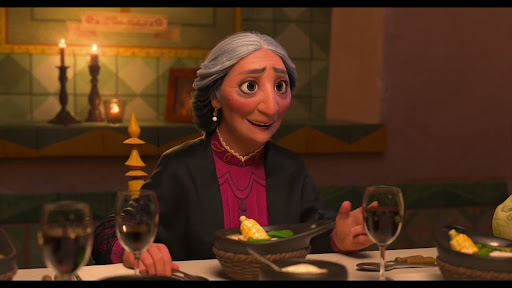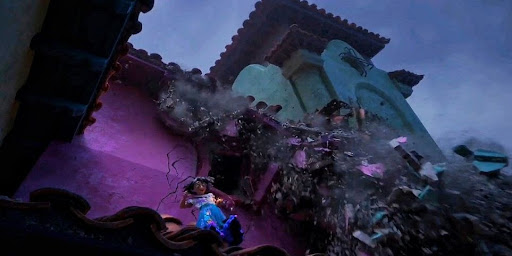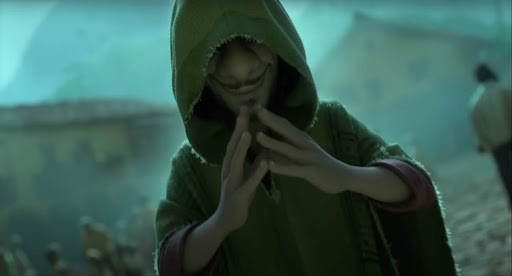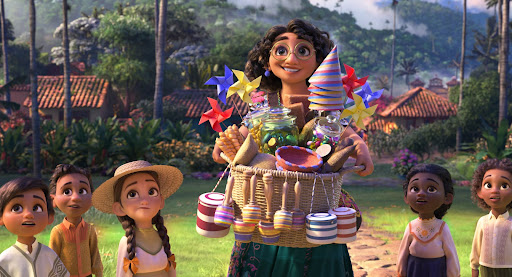I had very low expectations going into this movie, as most of Disney’s recent films had been generic sequels to its cash-crop movies like “Frozen.” I was completely wrong.
Upon first viewing, I was initially left confused. It felt a bit hard to follow. I found myself asking simple questions like “What was the conflict?” or “What was even resolved?”. Normally, it’s not a very good sign when your film, especially a children’s film, leaves the viewer incredibly confused. It was only after rewatching the film that I began to realize how much of an animated masterpiece this movie is.

The film itself is about a family named the Madrigals, who live in a magical village in a secluded part of Colombia. The magic was first created after the matriarch of the family, Abuela, lost her husband while fleeing their home when her children were infants. Her family and the village residents became protected from the outside by magic called the “Encanto,” which takes the form of an everlasting candle. It also creates a sentient house, called “Casita,” in which the Madrigals live. Each biological member of the family received a unique power from the Encanto when they came of age in a special ceremony. All of them, except for the movie’s protagonist, Mirabel. She loves her family but can’t help but feel insecure compared to the powers of the rest of her family.
Mirabel is only 15, and the second youngest of the family. Her youngest cousin, Antonio, is coming of age, and the family is very tense as Mirabel’s ceremony ended in failure.
Antonio’s ceremony ends up being fine as he receives his gift without issue. The family is overjoyed, and despite Mirabel’s attempts to deny it, it only makes her feel worse and more worthless to the family. While alone in her house, she sees cracks forming in the house and the magic itself. She warns Abuela and the rest of the family, but when they come to see the cracks, they are gone. Abuela doesn’t seem to believe her, and Mirabel ends up feeling more ostracized.
She retains a cut on her hand from the cracks in the house and believes something is truly wrong with the magic. She resolves to save it and make her family proud. She learns that her super-strong older sister, Louisa, was struggling to lift things when the cracks were reported. Louisa reveals that their estranged, fortune-telling uncle, Bruno, had a vision about it before he had disappeared years prior.
Mirabel sneaks into Bruno’s now-abandoned room, and she finds the vision he had, where she is seen at the center of the Encanto’s cracks. Abuela finds her but is unable to realize what she is up to as Louisa’s struggles worsen. Abuela is currently trying to arrange a marriage between a man in town and Mirabel’s other sister, Isabella, with whom she has a very fraught relationship. Isabella appears to be perfect, growing hundreds of flowers for people around her.
The rest of the family and village then warn Mirabel of how Bruno and his visions would frequently cause misery and chaos for those involved. She is unable to fully comprehend the vision before the whole family is called to an engagement dinner for Isabella that Abuela had set up.

Despite Mirabel’s efforts to keep the discovery of Bruno’s vision and her part in it under wraps, the vision is revealed to the rest of the family, including Abuela. The dinner is an absolute disaster, and Mirabel proclaims her innocence as an angry Abuela affirms to the distraught townsfolk that everything is fine with the Encanto.
Mirabel then finds Bruno himself, who had been still living in the house, in secret. He explains how he disappeared because he knew, given his reputation, that his visions of Mirabel would lead to her becoming ostracized like him. He reveals that he never actually left because he still loves his family despite what they think of him. He is also revealed as having manually fixed the cracks in the Casita. He explains how when he had the vision, it was all out of order, and it wasn’t set in stone. He couldn’t tell if she was causing the cracks or saving them.
Although initially reluctant, Mirabel, with Antonio’s help, is able to convince Bruno to have another vision. He does so, where he sees that Mirabel must make amends with her sister, Isabella. She is initially too prideful to do so, but Bruno convinces her to reconcile before returning to hiding.
She confronts Isabella, who is initially furious at Mirabel for ruining her engagement before Mirabel helps her confess that she never even wanted it in the first place. Isabella realizes how much she hates being perfect and reconciles with Mirabel. The cracks in the Casita are shown visibly fixing themselves before the sisters’ eyes.
All seems well until Abuela returns. She is furious at Mirabel for ruining Isabella’s engagement and angrily chastises her. Mirabel then tensely defends herself and Bruno, who Abuela accuses of not caring about the family. The cracks reappear and worsen. Abuela screams at Mirabel, blaming her for the magic fading. Mirabel, with tears in her eyes, finally snaps at Abuela, calling her out on never finding her or anyone else good enough for the family. As the cracks get even worse, and the earth shakes, Mirabel says Abuela never cares about the family at all.

The ground itself and the village begin to crack and break as their house begins to fall apart. As the house is collapsing, the family loses their gifts, before the entire family is ejected by Casita. Mirabel desperately tries to save the magic candle from Abuela’s room as she sees Bruno flee as well. She just manages to grab the candle in time, before the entire house begins to collapse on top of her. Casita manages to save her as the entire house falls apart. When the dust settles, the candle goes out, and Casita is no more.
Mirabel is fine, but the entire family is distraught over the loss of their house. Mirabel runs away, and everyone starts looking for her, to no avail. Abuela eventually finds her, at the river where her husband was killed and the miracle was subsequently born.
Abuela has a flashback to their lives, up to where their children were born when violence forced them to flee their home. Her husband was slain protecting them. Abuela is shown collapsing in grief, and that grief gave birth to the miracle. Abuela admits that her desire to not lose her home again made her seek perfection from everyone in her family, and she began to value their abilities more than themselves.
She admits the family magic is ruined because of her, and that she sees how the miracle is the family itself, not their gifts. She apologizes to Mirabel, and they embrace and reconcile. With Bruno in tow, they return to the wreckage of the house, and the whole family reunites.

In the final musical number, the entire village comes to help the Madrigals rebuild their home manually. With their newfound appreciation for each other and with hard work, the house is rebuilt. The last piece, a doorknob, is added by Mirabel, with her family encouraging her. After the final addition, the magic returns. Casita comes back to life, and the family regains their powers as the film ends.
I found the plot of the film very nuanced and subversive, although it came off as confusing the first time I watched it. It highlights great aspects of family drama and strife, in addition to issues of self-worth and perfectionism.
There were many moments that hit you right in the heart with their messages and themes. The scene of the house collapsing is incredibly intense and hard to watch, all ending in a tragedy that hits hard for both the family and the audience. It reminded me a lot of Mufasa’s death scene in “The Lion King.” When you see “The Lion King” for the first time, and assuming you haven’t been spoiled, you don’t ever expect Mufasa to die in such a dramatic and heart-wrenching way. Mufasa’s death and the Casita collapsing are both very emotional and pulse-raising. It’s one of those instances where the movie does subvert its audience’s expectations, and it took me completely off-guard. It’s obviously not as emotionally traumatic as Mufasa’s death, but the whole ordeal is justifiably impactful for those involved.
The plot point of Mirabel running away was fairly obvious to see coming for a while, yet it still felt nuanced, properly built up to, and executed. Even the method of finding her, that being a bit of yarn found by Abuela, was hinted at early in the movie. Mirabel sews her own clothes, and she is seen leaving a string hanging at the very beginning of the first song.
I think that having their powers get restored at the end kinda defeats the purpose of the story, especially when many of their gifts ended up being burdensome on the family themselves. That being said, with the knowledge and lessons learned throughout the movie by the family, you know that they will be better off with their powers now.
The Madrigal family is full of vibrant and funny characters. With so many family members, and the runtime type of an animated film, some family members ended up being less featured than others. This was a shame, as I found many of the characters to be entertaining and relatable. The only family member that came off as remotely cliche to me was Isabella, whose plot elements of learning to not be perfect and having an arranged marriage, are very common tropes at this point that Disney has used many times before.
The movie doesn’t waste any of its time or animation, and the background often has fun details and moments that help flesh out the family and village into real characters.

Mirabel was a very quirky and fun protagonist. Because of her struggles of self-worth surrounded by many incredible gifted characters, she was insanely relatable to me. Stephanie Beatriz really nailed the role and all that comes with it.
One of the movie’s best characters is Bruno. Growing up, I always associated John Leguizamo as the voice of Sid the Sloth from “Ice Age,” but he really brings a sense of eccentricity and awkwardness that was both fun to watch and relatable. Bruno is vilified for his gift through mistreatment and misjudgment by the village and his own family. He leaves it all behind to protect his niece from the unfair treatment he had lived his whole life with. Despite what everyone thinks of him and how they treated him, he can’t help but still love his family, so he still lives there in secret. He brings a lot of humor to the role, coming off as both misunderstood and very adorable to see how he interacts with Mirabel. While his screen time is limited, Leguizamo makes it count, and it also doesn’t hurt a character when the movie’s catchiest song is all about them, although we’ll get to that later. It’s no surprise to me that this character has become a meme already, and I mean that in a good way.
This movie is different in that there is no clear villain in the story at all. Abuela is definitely the antagonist in the plot, but she is far from a bad person. She never means any ill will in what she says and does to her family. The only scene where she acts genuinely malicious, albeit in a moment of anger, is when she snaps at Mirabel. Apart from Mirabel and Bruno, she doesn’t have any clear influence that has been negatively impacting her family and their gifts. At least when I watched the film for the first time. You can pick up on the negative influence her desire for perfection has had on the entire family the second time watching it. Her interactions with many of the family members have an aura of too much control over them, and she expects too much from anyone and everyone. This has led to a lot of negative emotions building up in the family, and this is very prevalent in Isabella and Louisa’s songs.
Much of this only became apparent the second watch-through. Perhaps an animated film directed at kids primarily shouldn’t have so much depth and subtlety that it warrants a second watch to understand its themes, but I think it’s totally better because of it.
Speaking of songs, the music for this film is phenomenal. The songs were written by Lin-Manuel Miranda, who wrote the songs for both “Moana” and “Hamilton.” In my opinion, Miranda has solidified his contribution to the musical theatre industry as a Shakespeare of music writing for a long time.

This movie is animated so beautifully it feels insane. Isabella’s powers of spreading flowers lead to beautiful animation every time she appears, which also helps enforce her perfect persona. I love the details with sand and dust on Mirabel at different points in the movie. The character designs are unique and visually distinct, and all the clothes look vibrant and colorful. The animation of the Madrigal’s powers, especially Bruno’s visions, was very stunning and clean. From an animation standpoint, this movie is nothing short of enthralling to the eyes.
“Encanto,” much like the family it portrays, is nothing short of a magical experience: Charming, sweet, heartwarming, and a musical masterpiece from start to finish.

Spinnaker rates this movie 5 out of 5 sails.
___
For more information or news tips, or if you see an error in this story or have any compliments or concerns, contact editor@unfspinnaker.com.
















